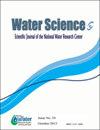Influence of household demographic and socio-economic factors on water demand in Ngamiland District, Botswana
Q2 Environmental Science
引用次数: 3
Abstract
ABSTRACT Water is one of the most important natural resources without which humans cannot survive. Although efforts have been geared toward ensuring an adequate water supply, potable water shortages continue to persist. This paper, therefore, analyses water demand at a local scale to enhance policymakers’ ability to make informed decisions on water demand management. The paper specifically probes the influence of demographic and socio-economic factors on household water demand in Ngamiland District of Botswana. Informed by neo-classical economic theory of supply and demand, a cross-sectional survey of 497 households was undertaken in Maun and Gumare villages. Household survey data collection was done using interview schedules and key informant interviews. The results revealed that gender showed a positive association with household’s monthly water demand, (X2 = 14.961; ρ < 0.05). The result of Spearman’s rank correlation test showed that household income and household size were the significant determinants of water demand. Household size was found to be the most variable influencing demand at a significant but moderate positive correlation with monthly water demand, rs = 0.422 and ρ < 0.05. The paper argues that policymakers might take into consideration the socio-economic parameters, which have a significant influence on water use and demand to implement proper demand management strategies.博茨瓦纳恩加兰地区家庭人口和社会经济因素对水需求的影响
摘要水是人类赖以生存的最重要的自然资源之一。尽管已经努力确保充足的供水,但饮用水短缺仍然存在。因此,本文分析了地方层面的水需求,以提高决策者在水需求管理方面做出知情决策的能力。本文具体探讨了人口和社会经济因素对博茨瓦纳恩加米兰地区家庭用水需求的影响。在新古典经济供求理论的指导下,对Maun和Gumare村的497户家庭进行了横断面调查。家庭调查数据的收集采用访谈时间表和关键线人访谈。结果表明,性别与家庭月需水量呈正相关(X2=14.961;ρ<0.05)。Spearman秩相关检验结果表明,家庭收入和家庭规模是影响家庭需水量的重要决定因素。家庭规模是影响需求的最大变量,与月需水量呈显著但适度的正相关,rs=0.422,ρ<0.05。该文件认为,政策制定者可能会考虑对用水和需求有重大影响的社会经济参数,以实施适当的需求管理战略。
本文章由计算机程序翻译,如有差异,请以英文原文为准。
求助全文
约1分钟内获得全文
求助全文

 求助内容:
求助内容: 应助结果提醒方式:
应助结果提醒方式:


